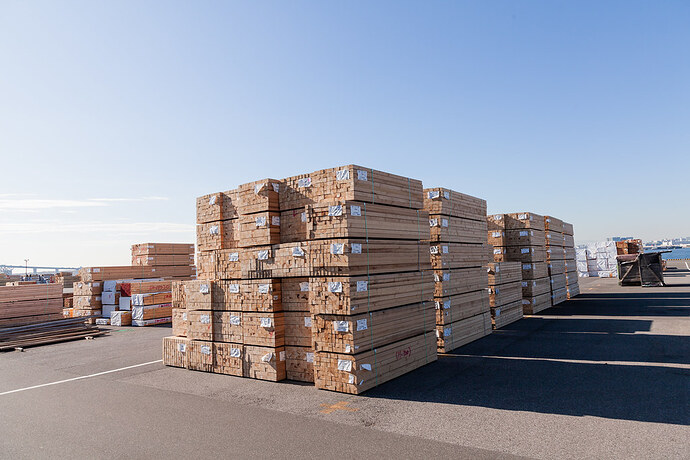US tariffs on Canadian lumber have resulted in costs of $10 billion since 2017, as well as thousands of lost jobs.
They call it the granddaddy of international trade disputes, and in the latest round, Canada has been hit once again by the U.S.
The dispute over exports of Canadian softwood lumber to the U.S. has been ongoing since the early 1980s, with the Americans insisting that the Canadian lumber industry is unfairly subsidized by federal and provincial governments.
The U.S. Department of Commerce claims this entitles the U.S. to levy tariffs on lumber crossing the border. These charges have already cost Canadian producers $10 billion since 2017 and have led to thousands of job losses in Canada.
But there’s more to come: The Americans are now increasing their current duties on Canadian softwood lumber products from 7.99% to 14.54%.
A hefty increase had been signaled by Washington, D.C., which in February spoke of a new rate of 13.86%. However, the actual change is even heftier than that, at 14.54%.
The U.S. increase is also retroactive, meaning it will apply to 2022 exports as well as future shipments.
Canadian industry leaders and governments are outraged.
“Enough is enough,” says Andy Rielly, chair of the Independent Wood Processors Association of B.C. “This dispute has gone on long enough. We call upon the Canadian government to find a negotiated solution and protect Canada’s small- and medium-sized family-owned businesses, which are collateral damage in this dispute.”
Mary Ng, federal minister of export promotion, international trade, and economic development, said in a statement: “Baseless and unfair U.S. duties on softwood lumber unjustifiably harm consumers and producers on both sides of the border.
“This latest measure will negatively impact workers and their communities. U.S. consumers and businesses that need Canadian lumber will bear the burden of these duties, making housing even less affordable for Americans.
“It is in the best interests of both Canada and the United States to find a lasting resolution to this long-standing dispute.
“We will always fight for the best interest of Canadians and continue to use all available avenues to vigorously defend the workers, businesses, and communities who rely on softwood lumber for their livelihoods.
“These include litigation under NAFTA and the Canada-United States-Mexico Agreement, at the U.S. Court of International Trade, and at the WTO.”
(NAFTA being the North American Free Trade Agreement, and the WTO being the World Trade Organization.)
Two B.C. ministers, Bruce Ralston, forests minister, and Andrew Mercier, minister of state for sustainable forest innovation, also weighed in:
Bruce Ralston: “I am immensely disappointed with the U.S. Department of Commerce’s decision to increase unfair and unwarranted softwood lumber duties. Alongside the Government of Canada and our partners in the forestry sector, we will continue to fight unfair duties through every avenue. Premier David Eby has spoken directly with the U.S. ambassador, calling on the U.S. to end American duties, and instead champion economic opportunity and lower costs for people. We have said from the start and will say it again now: The only solution is an end to unfair softwood lumber duties.”
Andrew Mercier: “While we fight the U.S. Department of Commerce’s decisions every step of the way, we will redouble our efforts alongside the Government of Canada, our provincial partners, and the forest sector to end unfair duties that are hurting people.”
To all of this, the U.S. lumber industry replies: “This United States government ruling substantiates that Canada continues to subsidize and dump its softwood lumber products in the United States, distorting the U.S. softwood lumber market to the detriment of U.S. sawmills, their employees, and communities."
The issue is the U.S. position that the prices paid by forest companies to harvest timber on Crown land in Canada (through ‘stumpage’ fees) are set by governments and not through the competitive marketplace—unlike in the U.S., where most forest land is privately owned.
(In B.C., the major Canadian exporter of softwood, 95% of forests are publicly owned.)
The U.S. claims that the Canadian system constitutes an unfair subsidy and is thus subject to U.S. trade remedy laws. Under U.S. law, foreign trade benefiting from subsidies can be subject to a countervailing duty tariff to offset the subsidy and bring the price of the commodity back up to market rates.
There’s a long history here, going back to 1982, and Canada has usually ended up on the losing side of these major diplomatic battles, with tariffs set at varying rates over the years.
In 2023, Canada won a North American Free Trade Agreement (NAFTA) panel ruling that the U.S. would have to review key aspects of its determination on tariffs. However, the U.S. review stuck to its position, and rates have run as high as 27.22%, back in 2002.
For now, the latest U.S. tariffs and penalties will amount to 14.54%.
But if Donald Trump is elected president in November, expect worse. It was under his presidential watch in 2017 that the tariffs went as high as 24%, and he has long signaled that if re-elected, he’ll want to renegotiate NAFTA, with trade subject to his rule of “America first.”
